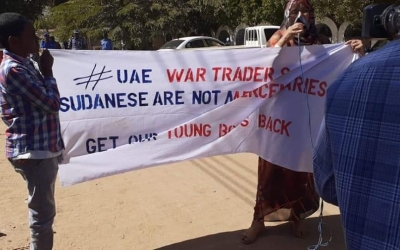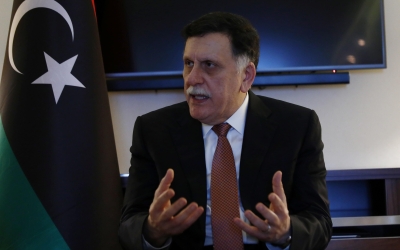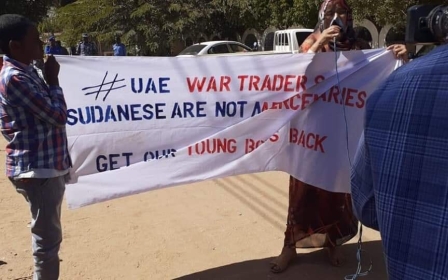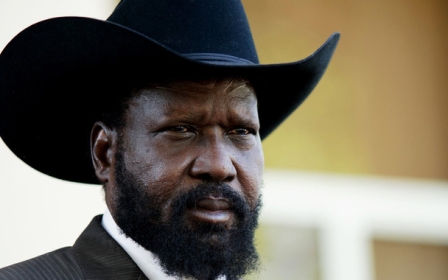Sudanese youths accuse UAE security firm of duping them into protecting Libyan oil fields
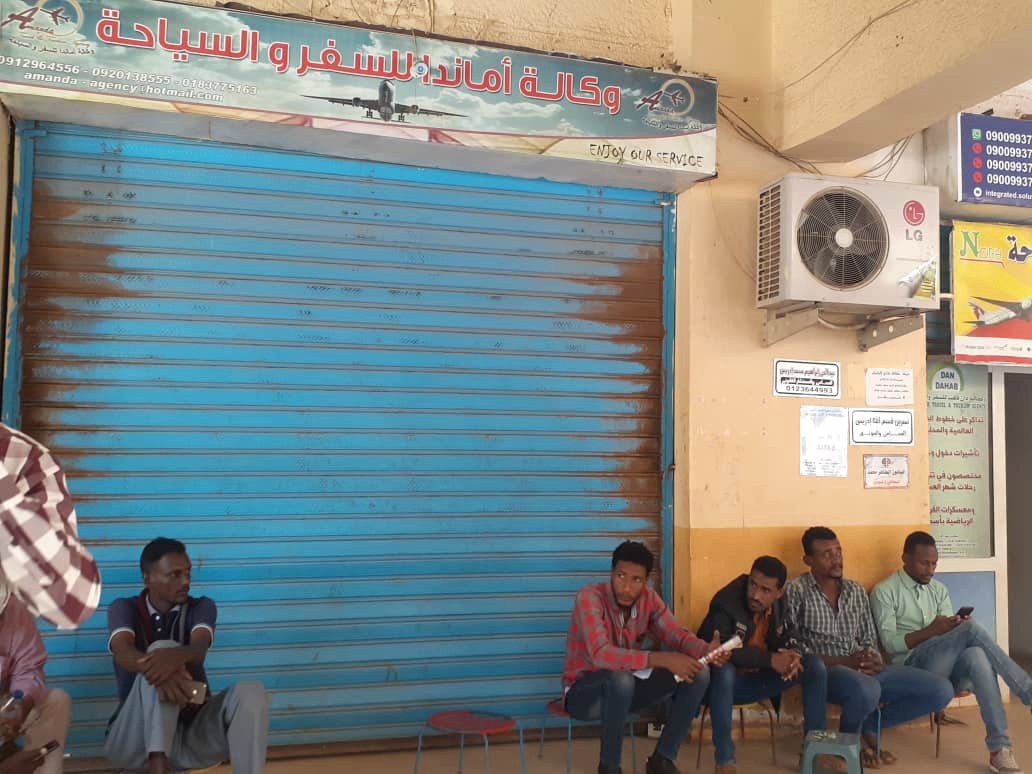
When Abdul Rahman Alzaki, who works as a teacher in Khartoum, read an advertisement last September from a travel agency looking for security guards in the United Arab Emirates (UAE) on a salary of around 8,000 AED ($2,175) per month, he thought his dreams had come true.
The 34-year-old IT engineer, who was looking for a better life for his family, went to visit the Amanda travel agency in the centre of the Sudanese capital that had placed the advertisement.
He was told the work was for the Emirati security firm Black Shields and that he would be located in Abu Dhabi or another UAE city.
Following several job interviews, Alzaki paid around 80,000 Sudanese pounds ($950) to Amanda after he was told the 8,000 AED salary had been confirmed and that the travel agency would transport him to the UAE.
He travelled to the Emirates on 19 January.
However, Alzaki's dream soon turned into a nightmare after he discovered that he would, in fact, be receiving three months of military training and then be sent to Libya to protect oil refineries and strategic locations in the area held by the eastern commander Khalifa Haftar, or Yemen.
Alzaki's story is the same one for all of the 50 young Sudanese men who were evacuated from the UAE on Tuesday as a result of the exposure of the deception.
The returnees disclosed that hundreds of their fellow nationals have been used by Black Shields to protect Emirati oil fields in Libya, as well as other facilities in war-torn Yemen.
Around 3,000 Sudanese are believed to have been deceived by Black Shields, which sub-contracted companies such as Amanda to advertise for the Emirati company.
Sudanese travel agencies in Khartoum working as sub-contractors for Black Shields have pocketed millions of Sudanese pounds from youths who answered the adverts amid high unemployment in Sudan.
Middle East Eye approached Black Shields for comment but had not received a reply at the time of publication.
'Human trafficking'
Speaking to MEE on his arrival back at Khartoum airport on Tuesday, Alzaki said: "When we reached the Emirates, we realised that we had been cheated, as the company had taken our passports, mobile phones and everything and sent us to a military training camp called Zayed Military City." The camp is located in Abu Dhabi.
Alzaki's sister Fayza told MEE that she considered the deception a crime and called on Sudan's government to stand with the victims.
“I do believe what happened is a kind of an attempt to use the Sudanese youth as mercenaries," she said.
"This is clear human trafficking and this company should be held accountable for that.
"Our transitional government is supposed to defend our rights and protect us and our dignity, especially after the Sudanese revolution.”
MEE visited the Amanda travel agency in downtown Khartoum on Wednesday, but the agency was closed and phone calls to the manager “Hozaifa” and other employees of the agency went unanswered.
Dozens of job seekers were waiting outside the agency in order to try to get their money back.
Ayman Khalifa told MEE that he had paid 5,000 Sudanese pounds ($55) to the agency as fees for a medical check-up.
“Me and a lot of others here have paid part of the fees to the agency and given them our passports, but you see now we can't get anything, it’s definitely a kind of cheating,” he said.
Boraey Mohamed Ahmed believes that they have been subjected to extensive cheating by a "mafia" working between the UAE and Sudan.
“It’s not only about Amanda, as there are many travel agencies, advertising agencies and medical centres (to do the medical checks) who are all working together as one network to bring the people to Black Shields,” he said.
Libya oil fields
Wearing the official uniform of UAE army, Ahmed Mustafa told MEE that they had been told by their colleagues in the camp and those who they met earlier during the interviews for the job, that they had been sent to work to protect oil fields in Libya, while others were sent to protect other facilities in Yemen after they finished the training.
The UAE is among several countries supporting Haftar in his campaign to oust the UN-recognised government in Tripoli.
“We made contact with the Black Shields company through the Sudanese sub-contracting agency called Amanda, and we paid between 80,000 and 120,000 Sudanese pounds ($950 to $1300)," said Mustafa.
"However, immediately after we arrived in Sharjah airport, they took us to a military camp in the UAE and we understood that they were intending to send us to Libya.”
For Mohamed Algizouli, another victim, the story dates back to last October when he read an advertisement placed by some travel agencies in Khartoum announcing that security guard job opportunities were available in the UAE.
Algizouli told MEE that he paid all his savings of 120,000 Sudanese pounds ($1,300) to travel there and get the job, but he was devastated when he reached the UAE.
“From day one when we arrived, the representative of Black Shields took all our belongings and prevented us from contacting anyone, so we become isolated in the military training camp of Zayed Military City,” he said.
“After many complaints, they allowed us to open our phones to talk to our families for only one hour.
"So we discovered everything and we knew from our colleagues who arrived in the UAE before us that they were now protecting the oil field of Ras Lanuf in northern Libya, while others were sent to Yemen to protect some Emirate facilities there.”
'Down, down UAE'
Circulation of the story on social media has ignited protests against the UAE and its policies in Sudan and in the region.
Thousands of Sudanese pro-democracy protesters have waged a wide campaign on social media against UAE policies, calling on the government to maintain the dignity of the Sudanese, especially after last year's revolution.
On Tuesday, hundreds of protesters demonstrated in front of the UAE embassy in Khartoum and the Sudanese Ministry of Foreign Affairs, calling for the return of the Sudanese youths.
The protesters have delivered a memorandum with their demands to the newly appointed minister of state at the Ministry of Foreign Affairs, Omar Gamareldin. Gamareldin promised that all of the victims will return to Sudan.
The protesters chanted anti-Emirate slogans and also called for the return of Sudanese soldiers from the war in Yemen.
Last year, Sudan announced it was withdrawing the majority of its troops fighting alongside UAE forces in Yemen, with Sudanese Prime Minister Abdallah Hamdok confirming that the country's forces fighting there had been reduced to 5,000.
“Where's the Sudanese dignity, down, down UAE, the Prince Zayed (Crown Prince Mohammed bin Zayed Al Nahyan) should fall," the protesters chanted.
'Exploiting the poverty of our youth'
Protester Atif Ahmed told MEE that they would continue demonstrating in front of the embassy until all of the Sudanese victims had returned from the UAE.
“It’s totally unacceptable, after the sacrifices during the Sudanese revolution in order to maintain the dignity of the Sudanese people, that we see what is happening these days with the Emirate, it's really a kind of humiliation for us,” he said.
Marwa Hassan, another demonstrator, also criticised the policies of the UAE on Sudan and the region as a whole.
“Why do they want to use our people as mercenaries in Yemen and Libya, we have nothing to do with their interests in these countries, why are they exploiting the poverty of our youth to use them badly like this,” she shouted.
For its part, the Sudanese government has said that it is closely monitoring the situation and is in contact with UAE authorities to guarantee the safety of the Sudanese youths.
It also said that the issue would not affect ties between the two countries.
“The Sudanese government is in intensive discussion with the UAE authorities to follow up on the situation of the Sudanese who are believed to have signed unclear contacts with a security firm in the UAE, some of whom were sent to Libya to work as security guards in the oil fields in Libya," it said.
Middle East Eye propose une couverture et une analyse indépendantes et incomparables du Moyen-Orient, de l’Afrique du Nord et d’autres régions du monde. Pour en savoir plus sur la reprise de ce contenu et les frais qui s’appliquent, veuillez remplir ce formulaire [en anglais]. Pour en savoir plus sur MEE, cliquez ici [en anglais].


